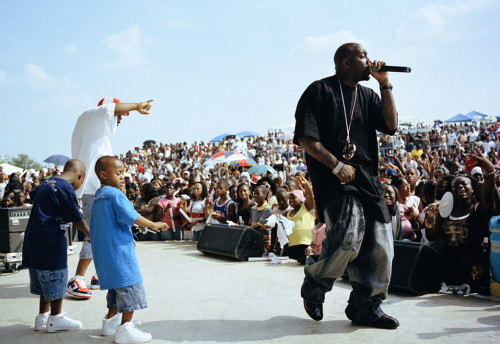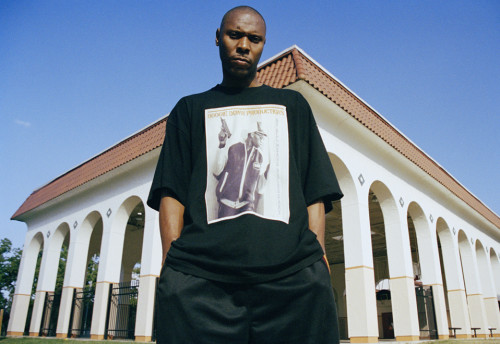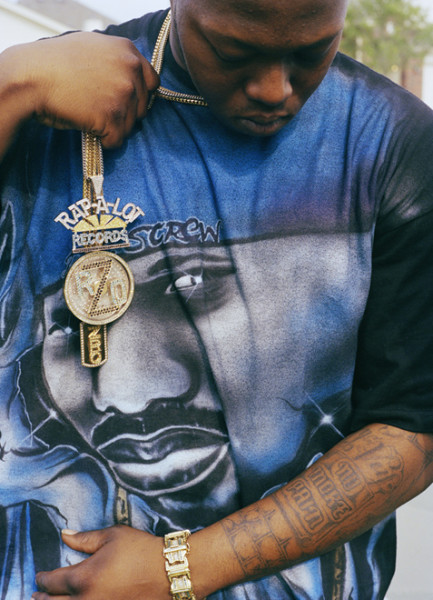Just Telling Stories: Peter Beste & Lance Scott Walker Help Houston’s Hip-Hop History Speak
 Once upon a time, Houston hip-hop was a secret. Beyond a couple of well-known names like the Geto Boys or UGK (who, hell, were actually from Port Arthur), nobody outside of the immediate Houston/Beaumont area had any idea hip-hop was alive and well and incredible down here on the dirty edge of the Gulf.
Once upon a time, Houston hip-hop was a secret. Beyond a couple of well-known names like the Geto Boys or UGK (who, hell, were actually from Port Arthur), nobody outside of the immediate Houston/Beaumont area had any idea hip-hop was alive and well and incredible down here on the dirty edge of the Gulf.
Nowadays, of course, the world’s a very different place. Rap fans on both coasts and beyond (including my wife’s cousin’s kid in Sweden, believe it or not) now know exactly what you’re talking about when you say the words “Houston hip-hop” — they know Paul Wall, they know Chingo Bling, they know Slim Thug (they parodied “Like A Boss” on SNL, for crying out loud), they know Bun B, and they know DJ Screw. Oh, hell yes, they know DJ Screw.
Looking backwards from a time where Houston rap stars break into the Billboard Top 10 and Bun B’s teaching courses at Rice University, it’s bound to be pretty crazy to think that there was ever a time when nobody not from here gave a damn. But there was, and it’s a time that needs to be remembered, recorded for the future.
Enter photographer Peter Beste and writer Lance Scott Walker, two expatriate Houstonians living way, way up north in New York City. The team is releasing not one but two separate books on Houston hip-hop, Houston Rap and The Houston Rap Tapes, a two-part ode to their common hometown and the music that comes from it. Together they’re an oral and visual history of a vital part of this city, a labor of love that Beste and Walker have spent nearly a decade working to make a reality, and now, they’re almost there.
In the run-up to the books’ release, a selection of Beste’s photographs of H-town’s rap luminaries are on display through May 3rd over at the Houston Museum of African American Culture, and this Saturday, April 20th, the HMAAC is hosting a roundtable discussion with a host of local luminaries and the authors themselves.
Prior to that, SCR talked for a bit with Lance Scott Walker, the writing half of the duo, about the books, hip-hop, and music in general. Here goes…
SCR: Okay, so how did the idea to do this come about? Not to put too fine a point on it, but I’ve always thought of you as more of an indie-rock guy than a hip-hop guy, and the last book of Peter Beste’s photos that I saw was about Norwegian black metal. How did both of you get here?
Lance Scott Walker: I was definitely more of an indie-rock guy as a writer early on, mostly by default. That was a natural progression from punk rock.
With hip-hop, I’ve always been sort of hot and cold — long periods where I listened to lots of it and long periods where I didn’t listen to any at all. And that goes way back — the first records I was buying were Fat Boys, Kurtis Blow, Wreckin’ Cru — even before I got into punk.
Peter‘s focus is fringe subcultures. That’s what drew him to black metal. The genesis of this project was that he wanted to come back to Houston from New York to shoot all the guys he grew up listening to in the ’80s and ’90s. After he started shooting, he encouraged me to come on board as the writer for the project, to provide context for what he was doing visually. So it was an influx of a lot of music, and I totally fell in love with rap again in a completely new way.
On kind of a related note, how long has this been in the works?
He started taking photographs in late 2004, and I started doing interviews in early 2005, right before “Still Tippin'” broke.
How did you meet up with Peter? You guys are two Houstonians in Brooklyn, right? Did you know one another beforehand?
Peter and I have been friends for 17 years. He would show up at gigs I was playing in the mid-’90s and take pictures of my band, and we always kept in touch after he moved away. We’ve traveled around a lot, working together on different projects over the years. This one is just the biggest.
This is going to be a little awkward, but you and Peter are both white guys, writing books about an African-American art form; what’s the reaction been like, from the people you’ve interviewed and from the press, pundits, etc.?
Well, we all love Houston. That’s a common ground with every subject in the book. You start from there, approach it with respect and gain the knowledge, and everything else falls into place. Peter and I work differently, but we have a similar approach and we learn from each other. We were flies on the wall in a lot of ways. Once we really got the project going, the reaction was a welcome one. It always comes down to trust.
The press so far has been great. They are really interested in Houston and have allowed their perceptions of the city to expand, which is exactly the idea!
How did you actually write the book, being up there in NY? I’m assuming it involved a lot of flying back-and-forth?
Tons of flying back and forth, lots and lots of phone interviews. Believe it or not, it’s been ideal doing it from afar. The first couple of years, I was still living in Houston and I met everybody and went to tons of shows and did lots of interviews in person. But being apart from it while doing a lot of the work has kept me focused and allowed me to look at it from the outside. You want it to communicate from more than one angle.
 Who did you interview for the books?
Who did you interview for the books?
Everybody from the Ghetto Boys/Geto Boys to members of the South Park Coalition, Screwed Up Click, Street Military, Swishahouse, Guerilla Maab/ABN, Wreckshop… Old-school folks like Romeo Poet, Rick Royal, Raheem, Born 2wice, Lil’ Troy, Lil’ Keke, Big Mike, Darryl Scott, Captain Jack, Mean Green, Wickett Crickett, Steve Fournier — mostly rappers, DJs, and producers, but also some radio and record label people, car people for the slabs part, and club promoters and dancers for the after-hours part of the photo book.
I also interviewed a minister who has known a lot of the Southside rappers since they were young. I didn’t interview other writers, for the most part, with the exception of Matt Sonzala, who’s as important to Houston rap as any artist. There is an interview with him in The Houston Rap Tapes.
While I’m at it, what are the book details? Are you the writer for both, or is one more of just a photo thing?
Houston Rap is the photo book. That one is primarily Peter’s photos, and an oral history from my interviews forms the narrative throughout. Bun B and I wrote separate intro pieces for it. The photos tell one story and the text tells another — a lot about Houston’s rap history, especially the beginnings back in the mid-’80s, but it touches on crime, drugs, sex, health, civic issues, conspiracy theories, the prison industrial complex, and the whole after-hours/off-the-grid atmosphere in the strip clubs that’s such a big part of how they break new songs in Houston.
Peter likes to say it’s “the good, the bad, and the ugly.” For the most part, the book lays out a lot of foundations instead of bringing you up to the current point in time. It doesn’t focus on the new stuff. It’s about the old guard.
The Houston Rap Tapes is sort of the opposite. That’s a book of my interviews with a black and white insert of Peter’s photos — different ones from Houston Rap — and then Willie D of the Geto Boys and I wrote the intro pieces. It expands on a lot of those themes, but the conversations go in all kinds of directions. Stories about the early days of the Geto Boys, DJ Screw, Swishahouse, South Park Coalition, that kind of thing. Both books focus heavily on the neighborhoods of Fifth Ward, Third Ward, and South Park, and the whole Southside area, where most of the rappers are from, and both are just under 300 pages.
Who’s publishing them?
Sinecure Books. It’s a new imprint formed by the books’ editor, Johan Kugelberg, who also edited Peter’s black metal book, and was also the editor of Born In The Bronx and that huge Velvet Underground book that came out last year, and Eothen Alapatt, who was formerly with Stones Throw Records and is behind Now-Again Records.
What’s the roundtable at the Houston Museum of African American Culture going to be like? Who all’s involved with that, and how did it get set up? Is it just a sit-down talk-type thing, or is there more to it?
Peter and I will host a talk with K-Rino from the South Park Coalition, E.S.G. from the Screwed Up Click and Rashad Al-Amin, who used to go by the name DJ Troy Ski in the early ’80s and went on to become an industry figure both here and on the West Coast. Carol Y. Guess, an attorney who has represented Swishahouse over the years and has ties to the museum, will do an introduction and take questions from the audience for the panelists after the talk.
The theme will be about rap music’s contribution’s to Houston history, but we’ll let it go whichever direction it goes and follow the stories. All of those guys are phenomenal story tellers and historians.
You did a similar panel thing, focused on DJ Screw, back in March at the University of Houston, right? How did that go?
That was great. I moderated a panel with Big Pokey, E.S.G., Lil’ Keke, and Meshah Hawkins, and then I personally invited one of Screw’s oldest friends, Shorty Mac, to join us. Matt Sonzala moderated another panel later in the day that focused on Screw’s legacy, so I focused our talk on Screw on a personal level.
We approached it less like a panel and just sat around telling stories. They were all brilliant. Julie Grob over at U of H has done a fantastic job of bringing this history to the people.
On a more general note, do you keep up on H-town rap these days? At the risk of pissing off your interviewees, do you have any favorites?
Well, I’m a music fan, so I totally have favorites, but I don’t let it factor in to the work. I’m going to admit I don’t like the new stuff as much as I like the old stuff, but that has a lot to do with the direction of the production and the way rap sounds nowadays. Also, no strike on the younger guys, but they just don’t tell stories the way the older guys do. They haven’t been through as much. You can’t trump experience, no matter how well you put together words.
So a lot of the rappers I like have been around for a while. K-Rino, Z-Ro, 3-2, Mike-D, Klondike Kat. I love Screw. Fat Pat, Lil’ Keke. Geto Boys, of course. I’ve been listening to them since high school. Also, our books focus on the more Southern rap side of things, but I love H.I.S.D. and that whole scene, which is a totally different thing. Those guys are really unique, really talented writers.
 How do you view Houston’s rap scene as a whole? Do you think it’s finally come into its own and started to get some respect from outside the city these past few years?
How do you view Houston’s rap scene as a whole? Do you think it’s finally come into its own and started to get some respect from outside the city these past few years?
Fuck yeah, it has. In 2004 and 2005, when the mainstream began to focus on Houston, a window to the culture opened up, and then that spotlight moved away like it always does. But I think that over the years, people have begun to realize that it wasn’t just a flash in the pan — that Houston didn’t just have those five or six artists that got hot right at once, and that there was a foundation in Houston that allowed them to flourish and become unique artists.
And for the most part, those artists that blew up in 2004/2005 didn’t change up their game to jump on the trends. I think people see that, and respect that. Combine that with Houston artists continuing to swell in numbers and being as prolific as they are, and people are seeing just how deep the culture really is.
Some people like to talk about how Houston’s moment has passed, but they weren’t paying attention before the “moment,” as it were, so they don’t process the fact that Houston has been chugging along doing its own thing for decades now. Independently. Its own economy. That’s what we hope to show in the books.
Do you miss it down here in Houston?
I totally miss Houston. I’ve been in New York for six and a half years now. I got married here last year. I’m based here, but I always love coming back to Texas and I never feel like I get to spend enough time there. Over the years, almost all of my trips have been business-related/rap-related, so I look forward to coming back and getting to hear some blues, some zydeco, go to a few places I haven’t had the chance to go in a while.
You’re not all about the writing these days, right? Can you talk about what you’ve got going on music-wise?
I was playing in a band called Bull Thieves with two other Houstonians my first few years here in Brooklyn. We did one album on my label Ojet, and then I released an album a few months back as The White Papers, which was the first full-length I’ve done under that name.
Collaborated with a bunch of people on that one, and a couple of former Houstonians. Brandon Davis from {Indian Jewelry}/The Electric Set plays on almost the entire record, and we’re working on some other stuff together. Played a bunch of shows around New York in the wake of that release, but I’m sort of putting music on the shelf for a little while, at least the playing-out-live part of it. Got a few other things to focus on in the meantime! END
(Photos: Trae Tha Truth; K-Rino; Z-Ro. All photos by Peter Beste.)



[…] music by DJ Chill @ Houston Museum of African American Culture (4807 Caroline; 4PM) Got to talk a little bit with Houston Rap/The Houston Rap Tapes co-author Lance Scott Walker (along with photographer Peter […]
[…] got to chat a bit with Lance about the books, and yours truly walked away feeling very freaking excited. Peter is an amazing photographer, and […]
[…] and expat H-towner/writer/musician Lance Walker (and hey, come to think of it, didn’t we interview him recently?). The duo will be spinning some of their favorite tunes, which may or may not fall into the […]